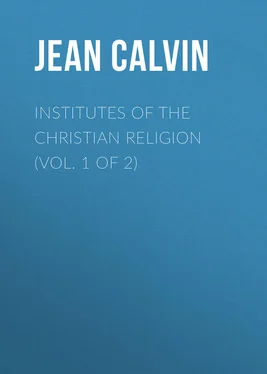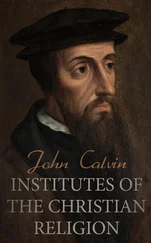Jean Calvin - Institutes of the Christian Religion (Vol. 1 of 2)
Здесь есть возможность читать онлайн «Jean Calvin - Institutes of the Christian Religion (Vol. 1 of 2)» — ознакомительный отрывок электронной книги совершенно бесплатно, а после прочтения отрывка купить полную версию. В некоторых случаях можно слушать аудио, скачать через торрент в формате fb2 и присутствует краткое содержание. Жанр: foreign_antique, foreign_prose, на английском языке. Описание произведения, (предисловие) а так же отзывы посетителей доступны на портале библиотеки ЛибКат.
- Название:Institutes of the Christian Religion (Vol. 1 of 2)
- Автор:
- Жанр:
- Год:неизвестен
- ISBN:нет данных
- Рейтинг книги:3 / 5. Голосов: 1
-
Избранное:Добавить в избранное
- Отзывы:
-
Ваша оценка:
- 60
- 1
- 2
- 3
- 4
- 5
Institutes of the Christian Religion (Vol. 1 of 2): краткое содержание, описание и аннотация
Предлагаем к чтению аннотацию, описание, краткое содержание или предисловие (зависит от того, что написал сам автор книги «Institutes of the Christian Religion (Vol. 1 of 2)»). Если вы не нашли необходимую информацию о книге — напишите в комментариях, мы постараемся отыскать её.
Institutes of the Christian Religion (Vol. 1 of 2) — читать онлайн ознакомительный отрывок
Ниже представлен текст книги, разбитый по страницам. Система сохранения места последней прочитанной страницы, позволяет с удобством читать онлайн бесплатно книгу «Institutes of the Christian Religion (Vol. 1 of 2)», без необходимости каждый раз заново искать на чём Вы остановились. Поставьте закладку, и сможете в любой момент перейти на страницу, на которой закончили чтение.
Интервал:
Закладка:
XXVI. Their objection, that Christ, if he be properly God, is not rightly called the Son of God, has already been answered; for when a comparison is made between one Person and another, the word God is not used indefinitely, but is restricted to the Father, as being the fountain of the Deity, not with regard to the essence, as fanatics falsely pretend, but in respect of order. This is the sense in which we ought to understand that declaration of Christ to his Father: “This is life eternal, that they might know thee, the only true God, and Jesus Christ, whom thou hast sent.” 285 285 John xvii. 3.
For, speaking in the capacity of Mediator, he holds an intermediate station between God and men; yet without any diminution of his majesty. For, although he abased himself, yet he lost not his glory with the Father, which was hidden from the world. Thus the Apostle to the Hebrews, 286 286 Heb. i. 10; ii. 9.
though he acknowledges that Christ was made for a short time inferior to the angels, yet, nevertheless, hesitates not to assert, that he is the eternal God, who laid the foundation of the earth. We must remember, therefore, that whenever Christ, in the capacity of Mediator, addresses the Father, he comprehends, under the name of God, the Divinity which belongs also to himself. Thus, when he said to his Apostles, “I go unto the Father, for my Father is greater than I,” 287 287 John xiv. 28.
he attributes not to himself a secondary Divinity, as if he were inferior to the Father with respect to the eternal essence, but because, having obtained the glory of heaven, he gathers together the faithful to a participation of it with him; he represents the Father to be in a station superior to himself, just as the illustrious perfection of the splendour which appears in heaven excels that degree of glory which was visible in him during his incarnate state. For the same reason, Paul says, in another place, that Christ “shall deliver up the kingdom to God, even the Father, that God may be all in all.” 288 288 1 Cor. xv. 24.
Nothing would be more absurd than to deny perpetual duration to the Deity of Christ. Now, if he will never cease to be the Son of God, but will remain for ever the same as he has been from the beginning, it follows, that by the name Father is intended the one sole Divine essence, which is common to them both. And it is certain that Christ descended to us, in order that, exalting us to the Father, he might at the same time exalt us to himself also, as being one with the Father. It is therefore neither lawful nor right to restrict the name of God exclusively to the Father, and to deny it to the Son. For even on this very account John asserts him to be the true God, 289 289 1 John v. 20.
that no one might suppose, that he possessed only a secondary degree of Deity, inferior to the Father. And I wonder what can be the meaning of these fabricators of new gods, when, after confessing that Christ is the true God, they immediately exclude him from the Deity of the Father; as though there could be any true God but one alone, or as though a transfused Divinity were any thing but a novel fiction.
XXVII. Their accumulation of numerous passages from Irenæus, where he asserts the Father of Christ to be the only and eternal God of Israel, is a proof either of shameful ignorance, or of consummate wickedness. For they ought to have considered, that that holy man was then engaged in a controversy with some madmen, who denied that the Father of Christ was the same God that has spoken by Moses and the Prophets, but maintained that he was I know not what sort of phantasm, produced from the corruption of the world. His only object, therefore, is to show that no other God is revealed in the Scripture than the Father of Christ, and that it is impious to imagine any other; and therefore we need not wonder at his frequently concluding, that there never was any other God of Israel than he who was preached by Christ and his Apostles. So, now, on the other hand, when a different error is to be opposed, we shall truly assert, that the God who appeared formerly to the patriarchs, was no other than Christ. If it be objected that it was the Father, we are prepared to reply, that, while we contend for the Divinity of the Son, we by no means reject that of the Father. If the reader attends to this design of Irenæus, all contention will cease. Moreover, the whole controversy is easily decided by the sixth chapter of the third book, where the good man insists on this one point: That he who is absolutely and indefinitely called God in the Scripture, is the only true God; but that the name of God is given absolutely to Christ. Let us remember that the point at issue, as appears from the whole treatise, and particularly from the forty-sixth chapter of the second book, was this: That the appellation of Father is not given in an enigmatical and parabolical sense to one who is not truly God. Besides, in another place he contends, that the Son is called God, as well as the Father, by the Prophets and Apostles. He afterwards states how Christ, who is Lord, and King, and God, and Judge of all, received power from him who is God of all; and that is with relation to the subjection in which he was humbled even to the death of the cross. And a little after he affirms, that the Son is the Creator of heaven and earth, who gave the law by the hand of Moses, and appeared to the patriarchs. Now, if any one pretends that Irenæus acknowledges the Father alone as the God of Israel, I shall reply, as is clearly maintained by the same writer, that Christ is one and the same; as also he applies to him the prophecy of Habakkuk: “God shall come from the south.” To the same purpose is what we find in the ninth chapter of the fourth book: “Therefore Christ himself is, with the Father, the God of the living.” And in the twelfth chapter of the same book he states, that Abraham believed in God, inasmuch as Christ is the Creator of heaven and earth, and the only God.
XXVIII. Their pretensions to the sanction of Tertullian are equally unfounded, for, notwithstanding the occasional harshness and obscurity of his mode of expression, yet he unequivocally teaches the substance of the doctrine which we are defending; that is, that whereas there is one God, yet by dispensation or economy there is his Word; that there is but one God in the unity of the substance, but that the unity, by a mysterious dispensation, is disposed into a trinity; that there are three, not in condition, but in degree; not in substance, but in form; not in power, but in order. He says, indeed, that he maintains the Son to be second to the Father; but he applies this only to the distinction of the Persons. He says somewhere, that the Son is visible; but after having stated arguments on both sides, he concludes that, as the Word, he is invisible. Lastly, his assertion that the Father is designated by his Person, proves him to be at the greatest distance from the notion which we are refuting. And though he acknowledges no other God than the Father, yet the explanations which he gives in the immediate context show that he speaks not to the exclusion of the Son, when he denies the existence of any other God than the Father; and that therefore the unity of Divine government is not violated by the distinction of persons. And from the nature and design of his argument it is easy to gather the meaning of his words. For he contends, in opposition to Praxeas, that although God is distinguished into three Persons, yet neither is there a plurality of gods, nor is the unity divided. And because, according to the erroneous notion of Praxeas, Christ could not be God, without being the Father, therefore Tertullian bestows so much labour upon the distinction. His calling the Word and Spirit a portion of the whole, though a harsh expression, yet is excusable; since it has no reference to the substance, but only denotes the disposition and economy, which belongs solely to the Persons, according to the testimony of Tertullian himself. Hence also that question, “How many Persons suppose you that there are, O most perverse Praxeas, but as many as there are names?” So, a little after, “that they may believe the Father and the Son, both in their names and Persons.” These arguments, I conceive, will suffice to refute the impudence of those who make use of the authority of Tertullian in order to deceive the minds of the simple.
Читать дальшеИнтервал:
Закладка:
Похожие книги на «Institutes of the Christian Religion (Vol. 1 of 2)»
Представляем Вашему вниманию похожие книги на «Institutes of the Christian Religion (Vol. 1 of 2)» списком для выбора. Мы отобрали схожую по названию и смыслу литературу в надежде предоставить читателям больше вариантов отыскать новые, интересные, ещё непрочитанные произведения.
Обсуждение, отзывы о книге «Institutes of the Christian Religion (Vol. 1 of 2)» и просто собственные мнения читателей. Оставьте ваши комментарии, напишите, что Вы думаете о произведении, его смысле или главных героях. Укажите что конкретно понравилось, а что нет, и почему Вы так считаете.












